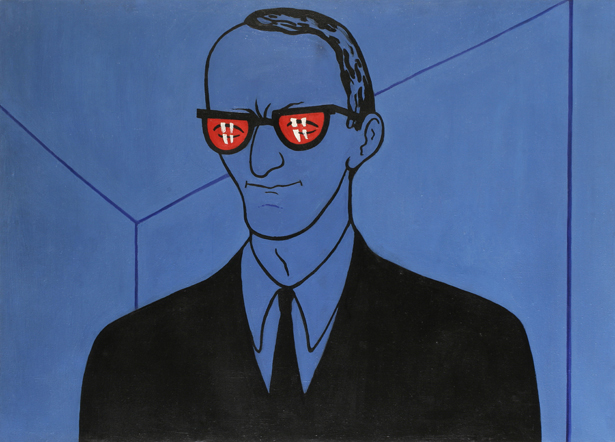The Magic of Art / The protagonists of contemporary Slovenian art 1968–2013
6 February–29 March 2015
Künstlerhaus Vienna
Karlsplatz 5
1010 Vienna
Hours: Tuesday–Sunday 10–18h,
Thursday 10–21h
T +43 1 587 96 63
F +43 1 587 87 36
office [at] k-haus.at
www.k-haus.at
dlul-drustvo.si
Curator: Aleksander Bassin, Ljubljana, Slovenia
The exhibition provides a historical overview of works by painters, sculptors and photographers, who used traditional media to shape their national culture with their modernist approach in the 1970s and 1980s, when both individuals and groups that promoted expressive new figuration and neo-constructivists. Embracing post-modernism at the end of the 1980s and in the 1990s led to retro-avant-garde and very individual poetics that resulted in new, very diverse cultural sphere in the independent Slovenia in the last 20 years.
In traditional media, some of the young generation of artists responded to the new developments beyond the national borders: to pop art, new realism, and narrative figuration, as well as the most extreme phenomena of radical realism—which were particularly examined at the international exhibition of photo-realism titled East of Eden at the Ludwig Museum in Budapest in 2011 and 2012—and designing ambiences and objects, i.e. transitioning from expressive meaning-based art to pure visualisation, harmonisation and the addition of spatial elements, the application of constructivist moments to anthropometric principles, the inclusion of rational semantics of colour and the dematerialisation of materials.
So, the restless eighties and early nineties already marked the operating strategy of the Laibach group and its far-fetched influence on the wide cultural, political and geographical context. The Irwin collective that emerged from Laibach in 1983 with a spectacular presentation of contemporary Slovenian art, have become well represented in European and US museums and galleries.
What was the situation at the end of the 1990s, what was forthcoming for the new millennium? It is certainly increasingly difficult to penetrate the numerous poetics of individual artists and recognise the vantage points of so many individuals. It is easier to promote artistic standpoints that maintain continuity with regard to the discoveries of modernism within the framework of post-modern pluralism.
Diverse sculptural language is still rooted in the resounding explosion of the 1970s and 1980s. This language can be quite minimalistic and fragmentary, but always derives from a clear standpoint, when the exploration of sculptural epidermis in terms of precessuality has concluded and crystallised.
Selected artists, whose works were borrowed from national, private and artists’ collections are painters (53), sculptors (18), graphic artists (6) and photographers (19). These works, which are categorised according to different decades, are accompanied by an “exhibition within the exhibition” titled Landscape as the Focal Theme.
The artist are Zvest Apollonio, Silvester Komel, Franc Novinc, Kostja Gatnik, Herman Gvardjančič, Dušan Kirbiš, Primož Bizjak, Bard Iucundus, Boris Jesih, Andraž Šalamun, Janez Hafner, Emerik Bernard, Maruša Šuštar, Bine Krese, Sergej Kapus, Tomaž Gregorič, Peter Koštrun, Ivan Dvoršak, Zmago Jeraj, Metka Krašovec, Franc Mesarič, Antonio Živkovič, Branko Cvetkovič, Breda Sturm, Aleksij Kobal, Sašo Vrabič, Miha Štrukelj, Lojze Logar, Marija Pengov, Bogoslav Kalaš, Berko, Milena Usenik, Darko Slavec, Josip Gorinšek, Žarko Vrezec, Bojan Bensa, Zdenko Huzjan, Živko Marušič, Irwin, Vlado Stjepić, Bojan Gorenec, Boris Zaplatil, Marjan Gumilar, Marko Kovačič, Ivo Prančič, Dušan Fišer, Klavdij Palčič, Sandi Červek, Gustav Gnamuš, Tugo Šušnik, Mojca Zlokarnik, Cveto Marsič, Oto Rimele, Plotajs Sicoe, Žiga Kariž Boštjan Jurečič, Zdenka Žido, Marko Jakše, Štefan Galič, Ivo Mršnik, Franko Vecchiet, Zora Stančič, Leon Zakrajšek, Črtomir Frelih, Tihomir Pintar, Stojan Kerbler, Joco Žnidaršič, Tone Stojko, Boris Gaberščik, DK, Goran Bertok, Jasmina Cibic, Eva Petrič, Uršula Berlot, Herman Pivk, Janez Vlachy, Janez Boljka, Tone Lapajne, Drago Hrvacki, Danilo Jejčič, Dušan Tršar, Tone Demšar, Dragica Čadež, Matjaž Počivavšek, Negovan Nemec, Lujo Vodopivec, Mojca Smerdu, Mirsad Begič, Jakov Brdar, Polona Demšar, Damjan Kracima, Tobias Putrih.
Aleksander Bassin is an art critic and publician, former director of City art museum of Ljubljana 1989–2009, Vice President of AICA International, Secretary of international Biennale of Small Sculpture in Murska Sobota and curator of numerous national and international exhibitions, even of the Slovenian pavillion in Venice, São Paulo, and the Triennial in New Dehli.


